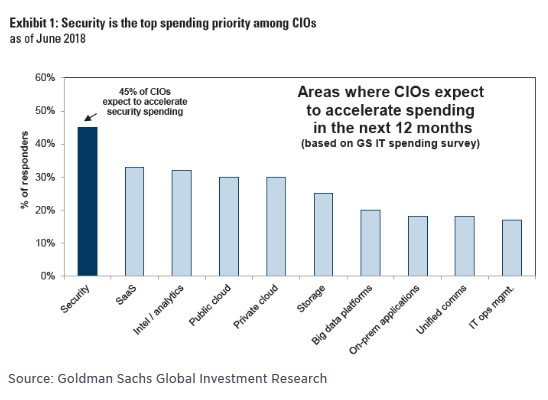Over the past few years, the digital and tech world has been witnessing an explosion in cyberattacks that take all manner of incarnations-- DDoS (distributed denial-of-service) attacks, corporate espionage, malware, ransomware and full-on campaign hacking.
The virtual inscrutability of bitcoin transactions has, however, spawned an entirely new category--cryptoviral ransomware extortion such as WannaCry where hackers lock up vital company data and demand ransom payment in bitcoin and other cryptocurrencies.
The problem has become so bad that companies have been stockpiling bitcoin in anticipation of future attacks.
It all adds up to a huge cost to the global economy, and is the reason why cybersecurity stocks have remained red-hot compared to the broader market in general.
And now a leading Wall Street analysts has given its stamp of approval for companies that design tools that fight this egregious threat.
In a note to investors, Goldman Sachs has said that cybersecurity stocks present a compelling short-term bet due to the 2018 mid-term elections slated to be held in November.
According to the most recent Goldman Sachs IT Spending Survey, security is the top priority among CIOs, with companies planning to increase cybersecurity spending by 45 percent over the next 12 months.

(Click to enlarge)
Source: CNBC
Cybersecurity Growth
Cybersecurity stocks in general have been outstanding:
• ISE Cybersecurity Index (HXR), a broad-based market cap-weighted index that tracks cybersecurity companies is up 25.3 percent in the year-to-date;
• PureFunds ISE Cybersecurity ETF (HACK) has tucked on gains of 23.9 percent;
• The First Trust NASDAQ Cybersecurity ETF(CIBR) is up 20.1 percent over the timeframe; Related: The Looming "Hyper-War"
Even stocks that are not pure-play cybersecurity plays such as Cisco Inc. (NASDAQ:CSCO) and Akamai Technologies (NASDAQ:AKAM) have done well, too, after gaining10.6 percent and 20.9 percent, respectively.
Goldman points out that cybersecurity companies have been seeing lots of business, and are likely to continue doing so in the near-term. In fact, it says the top 10 components of HXR (which includes Cisco, Symantec Corporation, Juniper Networks, F5 Networks and Verint Systems, among others) are expected to grow sales faster than the Info Tech sector and nearly three times faster than the S&P 500 median.
Goldman Sachs, however, warns that these stocks could end up performing below expectations if trade wars escalate and put the skids on global economic growth.
Investing in Cybersecurity ETFs
In the relatively small universe of anti-hacker stocks, there are at five cybersecurity ETFs that give exposure to the industry. Two of those, however, invest solely in the theme—HACK and CIBR. So, if you need to focus solely on cybersecurity stocks but don’t want to research and cherry pick a few, those two are the way to go.
Related: Bezos’ Space Flight Gamble
The two ETFs are remarkably similar. HACK is the better-known of the two, having managed to rack up assets of $1 billion just months after its November 2014 launch. The key differences between the two are:
• Costs—HACK is the more expensive ETF to own of the two, sporting an expense ratio of 0.75 percent compared to CIBR’s 0.60 percent. CIBR, however, tends to trade with a wider spread, which tends to close the expense gap considerably.
• Liquidity—HACK has 35 holdings to CIBR’s 33. CIBR, however, places more emphasis on liquidity, which it achieves by ensuring that its holdings have a minimum free float of 20 percent and market cap of at least $250 million and a minimum three-month average daily trading volume of $1 million. HACK, on the other hand, requires a minimum market cap of $100 million but does not specify a liquidity threshold.
By Alex Kimani For Safehaven.com
More Top Reads From Safehaven.com:
















